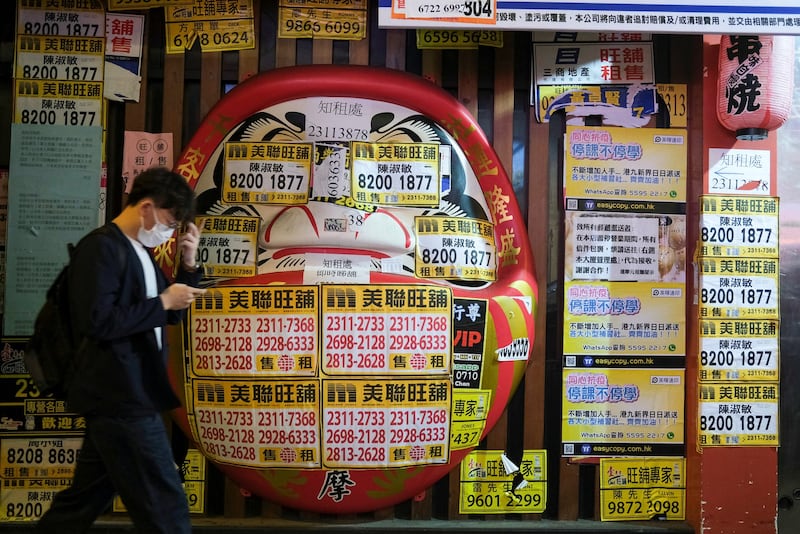In a further sign of Hong Kong’s economic woes, the city’s biggest banks are recording a surge in overdue loans amid the broader contraction of tens of billions of dollars in corporate lending.
The downtrend is collectively reflected in the annual results disclosed by Hang Seng Bank, Bank of East Asia (BEA) and Standard Chartered Bank, where the impact of the domestic real estate market, high interest rates and poor market conditions have led to an increase in “defaults” and overdue repayments. Loans to industrial and commercial entities, small and medium-sized enterprises and venture capital accounted mainly for the business decline.
At the same time, petitions for compulsory liquidation of companies have rebounded, reaching 67 cases alone in January, representing a 63% jump from the previous month and fast approaching the peak of the COVID-19 epidemic four years ago.
Analysts pointed out that this reflects lack of confidence in the Hong Kong market – China’s international financial center – where investors are fearful to invest while some others struggle to repay credit. Banks could face increasing pressure as the number of bankruptcies and liquidations may have yet to emerge.
The annual financial results of Hang Seng, BEA and Standard Chartered showed that while overall performance has improved, their loan books, an indication of demand, have shrunk. The amount of local corporate loans for Hang Seng and East Asia fell more than 3%, with Standard Chartered’s dropping a bigger 7.6%, due to reduction in property investment, trade, small and medium-sized enterprises and venture capital were the “hardest hit areas.”
Hang Seng’s industrial and commercial loans slid 13% on the year and BEA’s portfolio slipped 6.2%. Loans for Standard Chartered which classified lending under “corporate, commercial and institutional,” “individual, private and small and medium-sized enterprises” and “venture capital business” dropped 4.9%
The banks said they were more cautious in approving loans in light of the economic uncertainty and a high interest rate regime.
Financial commentator Ngan Po Kong said the banks’ performance shows a decrease in investment demand and activities, underpinned by weak investor confidence.
As banks act prudently and the high interest rate environment reduces loan demand, it means a reduction of funds in the market, which Ngan pointed out, could be seen as a sign of the negative prospect, eroding public confidence to invest.
In addition, the results of the three banks also reflected the deterioration of non-performing loans due to the impact of the domestic housing crisis,where prices have been falling.
Among them, Hang Seng and BEA’s loans that were overdue for three months or more surged by more than 60% last year, which was mainly dragged down by the sharp increase in impaired loans that were overdue for more than six months. Correspondingly, their “total impaired loans” ratio, an indicator of bad debt, has also worsened, widening about 0.3%. The ratios were 2.83% and 2.69% for Hang Seng and BEA, respectively.

Integrated economic destiny
Hong Kong has suffered a prolonged “economic winter” in recent years. Vacant shophouses in major commercial districts of Tsim Sha Tsui and Mongkok are on the rise. According to industry statistics, the vacancy rates of street-level shops and office buildings in core areas are as high as 9.7% and over 16%, respectively.
Because the Hong Kong market has shifted to focus primarily on the mainland Chinese market in recent years, banks and the city’s stock and property markets have been dragged down by China’s real estate crisis, Ngan said. With both economies “fatedly connected,” “property prices and stock markets have fallen together,” leading to bankruptcies in Hong Kong to rise.
“Some analysts in the accounting industry point out that the bankruptcies will not peak until the middle of this year,” he said, adding that Hong Kong’s economic recovery lies in the rebound of China’s.
“The mainland has introduced many tactics lately, including lowering reserve requirements and reducing loan interest rates. I think it will take some time to see whether they are effective, and we cannot conclude that the economy has bottomed out and will recover soon.”
The Hong Kong Official Receiver’s Office announced that there were 753 personal bankruptcy petitions in January 2024, up 11.5% from December and a staggering 50% from the year-earlier period. In the same month, there were a total of 67 compulsory company liquidation petitions, an increase of 63.4% on the month and 48.8% from a year ago, closing in on the 68 cases in May 2020 and April 2022 when the waves of COVID-19 outbreak peaked in Hong Kong.
Translated by RFA staff. Edited by Taejun Kang.
